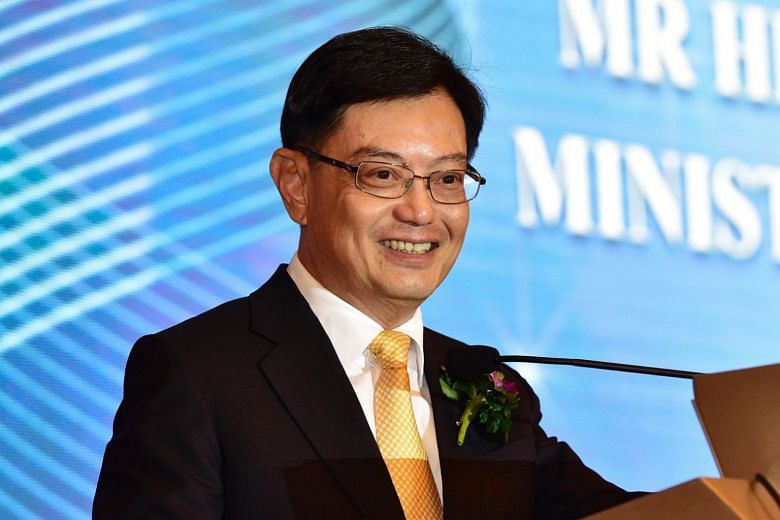Outcomes matter, Heng Swee Keat says in response to controversial Oxfam report
Sign up now: Get ST's newsletters delivered to your inbox

Finance Minister Heng Swee Keat called the Oxfam report "a completely wrong analysis" on the sidelines of the G-20, World Bank and International Monetary Fund meetings in Bali, on Oct 12, 2018.
ST PHOTO: DESMOND WEE
Nur Asyiqin Mohamad Salleh
Follow topic:
NUSA DUA (BALI) - Outcomes, not measures of input, are what matter, said Finance Minister Heng Swee Keat on Friday (Oct 12), in a sharp criticism of the way a report arrived at its conclusion that Singapore was among the 10 worst-performing countries at tackling the gap between rich and poor.
"Since resources are limited, it is very important that we can achieve good outcomes with the required inputs and not to wrongly measure inputs and then treat it as outcomes," Mr Heng told Singapore reporters in Bali. "That's a completely wrong analysis.''
The Commitment to Reducing Inequality Index, compiled by non-profit organisations Oxfam and Development Finance International, ranked Singapore 149th out of 157 countries, saying the Republic spends well below countries such as South Korea and Thailand on healthcare, education and social protection.
"I'm very disappointed to read the Oxfam report," the minister said. "I had a very good discussion with World Bank president Jim (Yong Kim), and Jim made a very important point in yesterday's forum that it is important for us to focus on outcome and not input."
While Singapore fared dismally in the Oxfam report, it clinched the top spot in the World Bank's inaugural Human Capital Index Mr Kim launched on Thursday (Oct 11), which ranks countries according to how well they are developing their human capital.
The World Bank's index looks at five indicators: The probability of survival to age five, a child's expected years of schooling, test scores, adult survival rate, and the proportion of children under the age of five who suffer from stunted growth.
In contrast, the Oxfam report, said the minister, "erroneously measured" performance by the amount of money spent by the public sector.
Mr Heng, who was attending the G-20 Finance Ministers and Central Bank Governors Meeting and the annual meetings of the International Monetary Fund (IMF) and World Bank, added that the World Bank with its new index hopes that countries will learn from one another how to achieve better outcomes.
"I'm glad Singapore has done well. We must not rest on our laurels. We must continue to upgrade," he said. "But at the same time, we'll be happy to share the lessons we have learned over the years. I hope that Singaporeans will feel confident that this system has served them well."
On the global market turmoil
The IMF-World Bank meetings this year had been clouded by anxiety over simmering trade disputes.
Mr Heng, in his wide-ranging comments before departing Bali on Friday, noted that global uncertainty has risen, financial markets are turbulent and the risk of a trade war has unsettled markets.
Singapore has been hit by the turmoil. Local shares plunged to a 20-month low on Thursday.
Mr Heng, who chairs Singapore's Future Economy Council, said that while the country needs to monitor the global situation carefully, it must at the same time "not let up in our effort in restructuring our economy, retraining our people, encouraging enterprises to develop deeper corporate capabilities so that they can compete much more effectively around the world".
The council is implementing 23 industry transformation maps, he said, adding that its work cannot be done overnight.
"We need to continue with these efforts but at the same time with the changing structures in our regional and global economies, there are new opportunities," he said, noting that technological advances have given rise to new areas of growth as well.
"We must plan for or think about how best we can ride on these new opportunities and prepare ourselves - our companies, people and regulatory agencies," he said.
On Singapore-Indonesia financial stability arrangements
Mr Heng also commented on a new Singapore-Indonesia deal for a US$10 billion local currency swap and US dollar repurchase agreement, saying it can be concluded "pretty soon". He believes it is an important way to promote financial stability.
The Asian and global financial crises decades ago have shown that instability in any part of the world can have a significant contagion effect, he said. "It is important for us to work closely with one another to safeguard regional stability."
Noting that the Indonesian economy has reasonably good fundamentals, he added: "We hope that our expression of confidence can help to stabilise the market."
Mr Heng also cited two measures taken to help avert financial upheavals.
After the Asian Financial Crisis, the Chiang Mai Initiative Multilateralisation agreement - a US$240 billion currency swap pact set up in 2010 among Asean member states, China, Japan and South Korea - came into being, and the Asean+3 Macroeconomic Research Office was set up to analyse financial conditions in the region.
"All this is to make sure that we minimise the risk of another major crisis," he said.
On leadership succession
Asked about leadership succession, Mr Heng said the 4G ministers work very closely together and are "looking at a number of things we need to do for Singapore".
"So, I think that our focus should not just be on succession," he said. "Our focus should be on the agenda going forward, what is it we need to do in Singapore to ensure it remains stable and prosperous, and that we provide good opportunities for our people in various realms, whether it is education, healthcare or public housing."
The team will be discussing these topics in greater detail in the months to come, added Mr Heng. "I'd like to assure Singaporeans that, in fact, we're working very well together as a team," he said.

